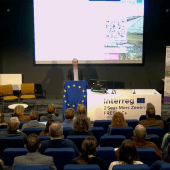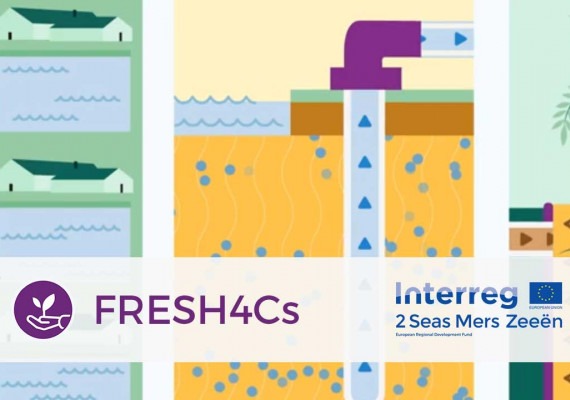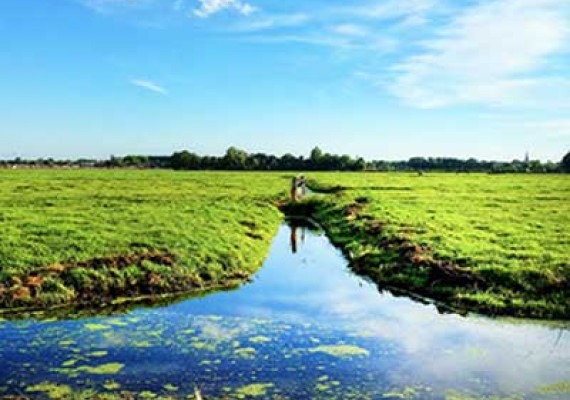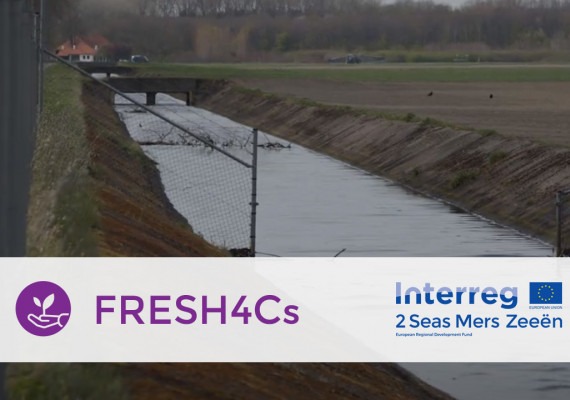FRESH4Cs
Alternative FRESH water resources for saline Coastal Areas
Priority Axis
Resource Efficient EconomySpecific objective
Efficient Use of Resources and Materials
Lead partner
VITO nvContact
Start Date
15/02/2019End Date
31/03/2023Project budget
5 022 935 €ERDF amount
2 760 958 €ERDF rate
55%About
Common challenge
The FRESH4Cs project focused on addressing the second priority of Europe 2020 which deals with emphasising sustainable growth. The project aimed to showcase the viability of alternative and sustainable freshwater sources for lowland coastal regions. The 2 Seas area faces escalating pressure on traditional water resources, a challenge exacerbated in lowland coastal areas by the salinisation of surface waters. These coastal lowlands, crucial for draining excess water to the sea during surplus periods, grapple with heightened water resource issues.
Whilst economic considerations have prompted reductions in water consumption, the following pivotal step in effective water resource management was the implementation of alternative and more sustainable sources. The strategy involved optimising the utilisation of freshwater resources currently directed to the sea, aligning with the project's objective of demonstrating innovative approaches to ensure a resilient and sustainable water supply in the face of environmental challenges. Through this initiative, FRESH4Cs sought to contribute to the overarching goal of fostering sustainable growth in the 2 Seas area.
Overall objective
Main outputs
Cross border approach
Main Achievements
FRESH4Cs demonstrated solutions for sustainable freshwater resources in coastal regions and did this by implementing 5 demos and a feasibility study. This was combined with reporting on the technological and non-technological barriers and opportunities that will enable wider replication in the 2 Seas area. At the end of the project, all demos had been successfully constructed and operated for some time, providing insights into their performance and potential to solve water problems in the 2 Seas area. A joint monitoring strategy of the performance of the demo, with a focus on water quality and quantity, ensured compliance with regulations and technology evaluation.
At Felixstowe (UK), a water transfer and buffering network has been operational since early 2021, delivering fresh water to farmers for irrigation. At the same site, partners constructed an underground water storage and recovery (MAR) installation. The technical evaluation showed great infiltration rates, but extraction was slower than expected, also leading to increased water costs. An important part of this highly innovative demo has been monitoring and regulatory aspects, as well as public-private cooperation. Also, in Kwetshage (BE) water was buffered, with a focus on above-ground buffering for nature as a water user. In Braakman Zuid (NL) a pilot scale installation for underground water storage demonstrated the technological aspects, while also regulation and cooperation between farmers and industry were key to success. For the same site, a feasibility study for large-scale application of underground buffering was made.
In Koksijde (BE) a nature-based solution was constructed and has been operational since late 2021. It treats membrane concentrate, removing nutrients and other pollutants. A feasibility study for effluent reuse from a food plant towards agriculture for Kruiningen (NL) has led to concrete investments in effluent treatment; it also indicated that underground storage is not possible but shows the potential for reuse through a piping system.
Non-technological barriers and opportunities are important to ensure further uptake of the solutions and partners collaborate to gain insight into each other's specific water framework, collaboration forms, technological issues and issues around monitoring and related regulatory aspects. These result in a roadmap for further replication.
Testimonial

Water is arguably the most critical natural resource that underpins all of society and economic activity. We recognise that climate change will continue to impact when, where, and how much water will fall as rain and we understand that growing the economy will require us to identify new sources of water as well as reserving much more to ensure biodiversity can recover. We are very clear that to meet these targets and rise these challenges we can’t merely rely on water companies to provide supplies in isolation or leave agriculture to find what they need on each individual landholding. We understand that previously isolated groups need to come together to look at big problems together to take on a much more holistic approach in order to find the solutions to these big challenges. This must involve the regulators, universities, landowners, communities, businesses, and indeed public organisations. That’s why I am so please to support this project and other similar endeavours. It seems to me that the people involved in this project exemplify the approach required to find truly sustainable solutions to our water supply challenge.
Cllr Richard Rout, Suffolk County Council



